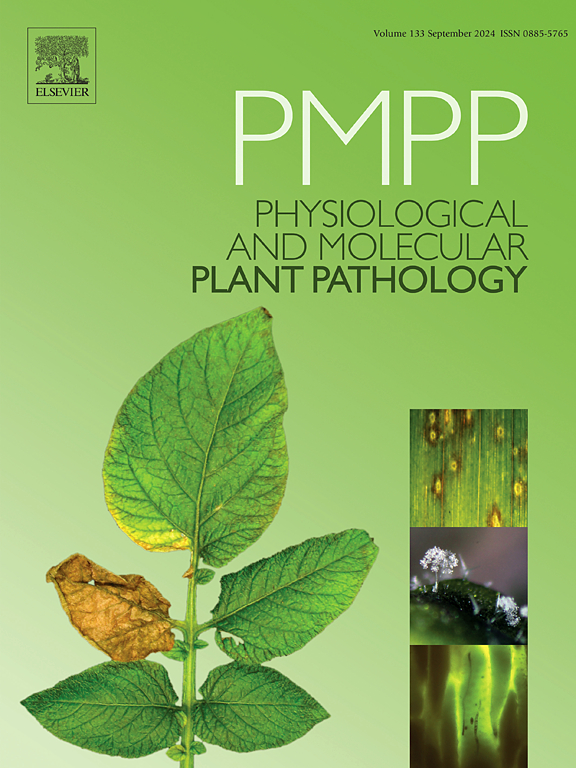LRR受体激酶PcLRR-RK2在辣椒疫霉生理和发病中的关键作用
IF 3.3
3区 农林科学
Q2 PLANT SCIENCES
引用次数: 0
摘要
植物含有许多富含亮氨酸重复受体样激酶(LRR-RLKs)的蛋白质。这些蛋白质有助于细胞内信号的传递,这对发育、生长和防御生物和非生物威胁很重要。虽然卵菌也包括LRR-RLKs,但对它们在这些生物中的功能知之甚少。本研究研究了辣椒疫霉(Phytophthora capsici)中PcLRR-RK2在辣椒疫霉生长、致病性和繁殖中的作用。结果表明,PcLRR-RK2是辣椒辣椒营养生长的必需基因,而PcLRR-RK2的沉默会导致辣椒辣椒营养生长的降低。该研究还表明,沉默PcLRR-RK2会导致动物孢子发生缺陷,导致孢子囊产生受损。进一步的研究表明,沉默PcLRR-RK2可以降低游动孢子萌发和渗透植物组织的能力,从而防止疾病形成的坏死灶的产生。同样,沉默辣椒辣椒菌丝体的侵染能力下降,不能广泛侵入植物组织。综上所述,我们的研究表明PcLRR-RK2是调控营养生长所必需的,从而促进游动孢子渗透和侵染寄主叶组织。本文章由计算机程序翻译,如有差异,请以英文原文为准。
Critical role for the LRR receptor kinase PcLRR-RK2 in the physiology and pathogenesis of Phytophthora capsici
Plants contain many proteins known as Leucine-rich repeat receptor-like kinases (LRR-RLKs). These proteins aided in the transmission of signals within cells, which are important for development, growth, and defense against biotic and abiotic threats. Although oomycetes also include LRR-RLKs, not much is known about their function in these organisms. In this research, PcLRR-RK2 in Phytophthora capsici was investigated for its contribution to growth, pathogenicity, and reproduction of P. capsici. Corresponding results obtained showed that PcLRR-RK2 is necessary for optimal vegetative growth of P. capsici, and silencing of PcLRR-RK2 resulted in reduced vegetative growth. This study also demonstrated that silencing PcLRR-RK2 causes defective zoosporogenesis, resulting in impaired sporangia production. Investigation further revealed that silencing PcLRR-RK2, which reduces the ability of zoospores to germinate and penetrate plant tissues, prevents the production of necrotic lesions indicative of disease establishment. Similarly, the mycelium of silenced P. capsici exhibited a deteriorated ability to cause infection and was unable to invade plant tissues extensively. In summary, our study suggested that PcLRR-RK2 is necessary for regulating vegetative growth, thereby facilitating the penetration and infection of host leaf tissues by zoospores.
求助全文
通过发布文献求助,成功后即可免费获取论文全文。
去求助
来源期刊
CiteScore
4.30
自引率
7.40%
发文量
130
审稿时长
38 days
期刊介绍:
Physiological and Molecular Plant Pathology provides an International forum for original research papers, reviews, and commentaries on all aspects of the molecular biology, biochemistry, physiology, histology and cytology, genetics and evolution of plant-microbe interactions.
Papers on all kinds of infective pathogen, including viruses, prokaryotes, fungi, and nematodes, as well as mutualistic organisms such as Rhizobium and mycorrhyzal fungi, are acceptable as long as they have a bearing on the interaction between pathogen and plant.

 求助内容:
求助内容: 应助结果提醒方式:
应助结果提醒方式:


